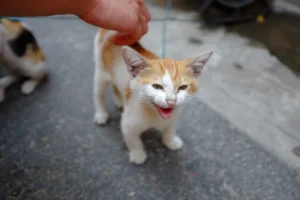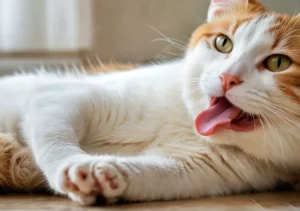It’s a peculiar sight: your feline friend, usually aloof, suddenly drops a “gift” at your feet. Whether it’s a stray mouse or a beloved toy, this behavior can leave any cat owner scratching their head.
Cats bring gifts to express affection, to show they consider you part of their family, or simply as a quirky instinct. But there’s a fascinating depth behind this behavior that goes beyond just a cat’s love — secrets and stories shaped by their wild ancestors that might surprise you.

Why Do Cats Bring Gifts to Their Owners
Cats engage in this quirky behavior for several instinctual reasons. Primarily, bringing gifts is rooted in their hunting instincts. When a cat catches a mouse, bird, or even a toy, it sees itself as a provider. In the wild, mothers bring prey back to their young as a form of teaching and nourishment. So when your cat presents you with its latest catch—be it a batty toy or a surprisingly thoughtful mouse—it’s a way of sharing its hunting success.
Another reason has to do with social bonding. Cats are often solitary hunters, but they’re also social creatures that form strong attachments. By bringing you gifts, they’re essentially saying, “Hey, look what I’ve found for us!” It’s a way of including you in their world, signaling that they consider you part of their family unit.
Additionally, it can serve as a communication tool. Cats are intuitive and can sense their owner’s reactions. If you show excitement or pleasure at their offerings, they might be motivated to keep doing it. Some cats use this behavior to get your attention or even prompt some playtime, so your response might reinforce the action.
Is It a Sign of Love
Gifting behaviors can indeed be a manifestation of affection. Your cat’s gifts are often about sharing happiness and establishing a stronger bond. Cats have their unique love languages, and for some, presenting their owners with “treasures” is a key way to express that they care. This gift-giving can feel like an invitation to engage in some shared joy, making it feel all the more special.
Consider how your cat acts around you—if it frequently gifts you items, enjoys your reactions, and seeks out interaction afterward, it’s a pretty solid indicator that this behavior is rooted in love and companionship.
Here’s a list of what these gifts can signify in terms of affection:
- Nurturing Instinct: Your cat may feel maternal and want to ‘care for’ you by sharing their “meals.”
- Play Invitation: The gifts often come with an invitation from your cat to join in a playful moment.
- Territorial Behavior: By sharing its catch, your cat might be marking you as part of its territory and pack.
- Seeking Approval: Gifting can reflect your cat’s desire to impress and gain your affection, showcasing its skills.
- Social Bonding: It’s about strengthening the bond between you two, affirming that you’re part of their family.
Understanding these motivations can help you appreciate your cat’s quirky behavior even more. If you’re ever curious about feline communication and behaviors, check out The Spruce Pets for more insights.
What Do Gifts Say About My Cat
Your cat’s tendency to bring you gifts is more than just quirky behavior; it speaks volumes about their instincts and personality. This habit likely stems from their hunter instincts. In the wild, cats often present their catches to their companions; it’s a way of sharing their success. Think of it as their version of saying, “Look what I found!”
The type of gift can reveal even more about your feline friend. For instance, a mouse toy or a bird feather signifies strong hunting instincts and a desire to showcase their prowess. If your cat brings you household items like socks or hair ties, they might be expressing playfulness or seeking your attention.
Moreover, this behavior can reflect your cat’s attachment to you. They see you as part of their group and want to share their discoveries. This act can be a sign of love and a way of bonding, acting like a cat love language. If they’re bringing you gifts often, it could simply mean they feel secure in your presence.
Why Does My Cat Choose Specific Items
The specific items your cat chooses to gift can reveal fascinating insights into their personality and environment.
- Hunting Success: Cats might present prey they’ve caught, be it a bug or a toy mouse, emphasizing their hunting abilities.
- Curiosity: Cats theexplore their surroundings, and items like bottles, string, or paper often allure them, resulting in these becoming potential gifts.
- Attention Seeking: Some cats know that shiny or unusual objects grab human attention, making these items prime candidates for gifting.
Taking note of these choices can help you understand your cat better. For example, if your cat favors items that make noise, they may enjoy stimulation and excitement. You can then offer more interactive toys to satisfy their play needs.
Extra Insight : Understanding your cat’s emotional state can also provide context. A cat gifting you more during stressful times might be seeking your reassurance or comfort. Observe their behavior: are they more likely to bring gifts when there’s noise outside or when you’ve had a busy day? This can guide your approach to creating a calming environment for them.
For further information on feline behavior, the ASPCA offers valuable resources: ASPCA Cat Behavior.
In essence, each item your cat brings is a little window into their world—filled with instinct, curiosity, and personality.
Is My Cat Trying to Teach Me Something
It’s quite possible your cat’s gifts are more than just random acts of affection. Cats are natural hunters, and when they bring you items like toys, small creatures, or whatever they find interesting, it can feel like they’re showing off their skills. This behavior often stems from their instinct to hunt and gather.
Your feline friend might be trying to share their success with you, much like they would with their kittens. In the wild, a mother cat will bring food back to her young to teach them how to hunt and survive. So, by presenting you with their “prey,” your cat could be conveying a sense of pride or even affection, wanting to involve you in their world.
Interestingly, this behavior can also signal that your cat sees you as part of its “family” and is including you in their hunting adventures. It shows trust and a desire for connection. Consider observing the type of gifts they bring and what it might signify about their mood or needs.
How Can I Respond to My Cat’s Gifts
Handling your cat’s gifting habit in a way that acknowledges their effort is key. Here are some ways to do just that:
Praise and Pet
– When your cat brings you a gift, give them a gentle petting session and verbal praise. This reinforces their behavior positively.Engage with the Item
– Play along with what they’ve brought you, but make it a fun game. Use a wand toy to mimic hunting, or toss a soft toy.Treats
– Giving a few treats after they present their offerings creates a positive association with the act of gifting.Designate a ‘Gift Area’
– If your cat tends to bring you less desirable gifts (like bugs), consider creating a designated spot in your home where they can deposit their treasures.Mindful Acknowledgment
– Simply acknowledging the gesture can also go a long way. A calm response can reassure your cat.
As a specific tip, ensure to differentiate between gifts. If they’re bringing you live prey, ensure to handle the situation safely. Redirecting your cat to appropriate toys can keep them engaged without potential issues of bringing the outdoors inside.
For more insights on cat behavior, consider checking out resources like the ASPCA feline behavior page.
Are There Differences Between Indoor and Outdoor Cats
The environment plays a huge role in your cat’s gifting habits. Outdoor cats often engage in hunting, bringing back prey as a way to share their bounty with you. They see this as a form of teamwork, showcasing their skills and feeding instincts. Meanwhile, indoor cats may not have that luxury but still possess the same instinctual behaviors. These cats might bring you toys or random objects they’ve “hunted” around the house, reflecting their desire to bond and share.
Indoor cats express this in unique ways. They might present you with a favorite toy, showing how much they appreciate your companionship. If you notice your feline pulling out old socks or random items, it could be their way of inviting you to play or get involved in their little game. Both types convey affection through their gifts; it’s their way of saying, “I care about you.”
Interesting Facts About Gift-Giving Cats
Gift-giving isn’t just a quirk—it’s a fascinating aspect of feline behavior. Here are some intriguing tidbits that highlight the unique ways cats express themselves through gifting:
Hunting Instincts : Cats are natural hunters. Even well-fed indoor cats will sometimes “hunt” their toys or other objects to mimic their instinctual behaviors.
Love Language : Cats consider you part of their family. By bringing you gifts, they’re offering a sign of affection, much like how humans might share food.
Teaching Moments : Mother cats often catch prey and bring it back to their kittens to teach them how to hunt. Adult cats might replicate this to share their skills with you.
Show Off : Your cat might want to impress you with their “catches.” It’s not just sharing; it’s about showing off their prowess!
Attention Seekers : Sometimes, the gifts are just a way to get your attention. If they feel neglected, they may bring you a “present” to prompt interaction.
Understanding these insights can give you a new perspective on your cat’s behavior. Keep in mind that every cat is unique—with their own little quirks and personality traits.
If you’re curious to learn more about feline behaviors, check out the ASPCA for helpful resources.
The Role of Cat Breeds in Gift-Giving
Certain cat breeds have a stronger instinct to bring you “gifts” as a part of their natural behaviors. This behavior is often tied to their hunting instincts. Breeds like the Siamese, Bengal, and Maine Coon are particularly known for their playful and active nature, which can lead them to hunt toys or smaller creatures and present them to their owners as trophies. This is their way of sharing love and acknowledging you as part of their clan.
Cats often see their humans as partners in their social hierarchy, and bringing gifts is a sign of affection and bonding. While all cats can showcase this behavior, those with the strongest instincts, such as Siberians or Oriental Shorthairs, may be more prone to it. The environment also plays a role; cats that have more stimulation—like outdoor access or engaging toys—might show less need to “gift” you since they can satisfy their hunting instincts more directly.
Pay attention to your cat’s behavior and breed traits; recognizing these nuances can help you understand your feline friend better.
What Should You Do With Your Cat’s Gifts
Handling your cat’s gifts can be a bit of a mixed bag. First off, a gift can range from a toy to something less desirable, like a bug or small rodent. Here’s how to navigate these moments with care and humor:
- Identify the Item: Take a close look at what your cat has brought. If it’s a toy, great! If it’s something organic, consider the safety risk.
- Safety First: Always wash your hands after handling any wildlife your cat hauls in. It might carry parasites or diseases that could affect you or your other pets.
- Appreciate the Gesture: Even though you might not be excited about a new “gift,” a little praise (like treats or petting) can encourage this affectionate behavior. They’re trying to show you they care!
- Create a Giving Area: Designate a space in your home for these gifts, like a little box or mat, so your cat feels recognized for their effort.
- Positive Diversion: If the gift-giving turns into too much of a nuisance (or danger), shift their focus with interactive toys or puzzle feeders to satisfy their hunting instincts.
As a final tip, keep the lines of communication open with your kitty. Bonding moments, whether with playful banter or quality time, will ensure your cat continues to feel that loving connection.
For more information on feline behavior, check out The Cat Behaviorist for additional insights!
Alex, a passionate animal lover, has experience in training and understanding animal behavior. As a proud pet parent to two dogs and three cats, he founded AnimalReport.net to share insights from animal experts and expand his knowledge of the animal kingdom.




